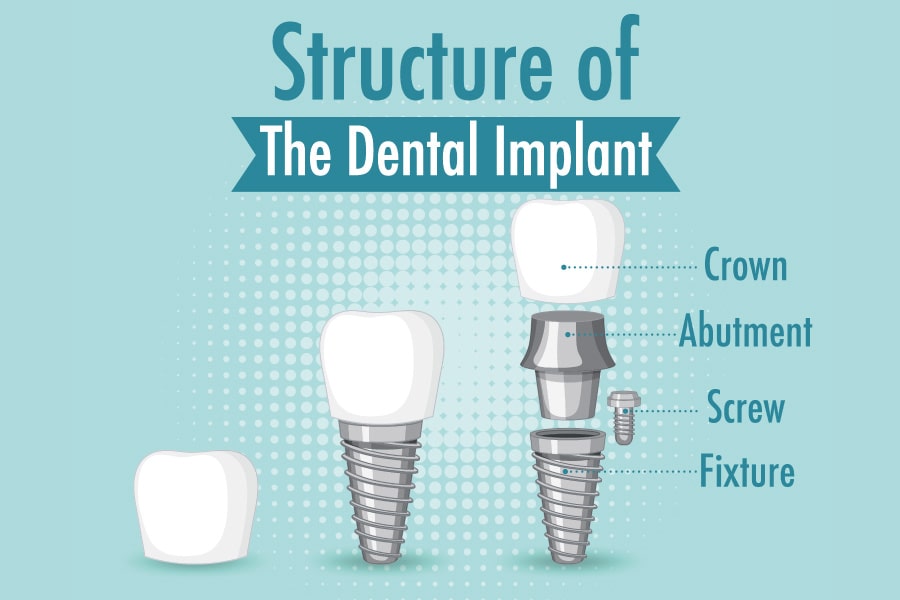Dental implants are a long-term and high-quality solution for replacing missing teeth. However, many patients ask: How much does a dental implant cost? Prices can vary significantly depending on multiple factors.
In this article, we will explain the cost structure, possible insurance reimbursements, and financing options. At Zahnarzt am Markt in Wiesbaden, we provide a transparent cost breakdown and personalized consultation for your implant treatment.
1. What Determines the Cost of a Dental Implant?
The total cost of an implant consists of several components:
- The implant itself: An artificial tooth root, usually made of titanium or ceramic.
- The abutment: The connector between the implant and the crown.
- The dental crown: The visible part of the tooth replacement, made of ceramic or metal-ceramic.
- Diagnostics and planning: X-rays, 3D scans, and digital planning.
- Surgical procedure: Placement of the implant into the jawbone.
- Aftercare: Follow-up appointments, potential adjustments, and long-term care.
Depending on your condition, additional costs may apply, such as bone grafting or premium materials.
2. Average Costs of a Dental Implant
The cost of a single implant depends on the technique, material, and complexity of the procedure. Here’s a typical price overview:
| Treatment | Average Cost |
|---|---|
| Single implant with crown | €2,500–€4,000 |
| Multiple implants (e.g., 3–4) | €8,000–€15,000 |
| Implant-supported bridge | €4,000–€7,000 |
| Full arch restoration with implants | €15,000–€30,000 |
| Bone grafting (if needed) | €500–€2,500 |
Note: Prices may vary depending on the clinic and individual treatment plan.
3. Does Health Insurance Cover Dental Implants?
Public health insurance in Germany generally does not cover the full cost of dental implants. However, it provides a fixed subsidy for prosthetic solutions (e.g., bridges or dentures).
How Much Is the Insurance Reimbursement?
- Without a bonus plan: €400–€600 per implant
- With a well-maintained bonus plan (5–10 years): Up to €750
Private health insurance and supplementary dental insurance often provide higher reimbursements—typically covering 50–90% of the total cost, depending on the policy.
4. Financing Options for Dental Implants
Since dental implants are a significant investment, many dental clinics offer installment payment plans or financing options.
Example Monthly Payment Plans:
- 6 months: €400–€900 per month
- 12 months: €200–€500 per month
- 24 months: €100–€250 per month
At our clinic, we offer flexible payment plans to make high-quality dental care more accessible.
5. Why Are Dental Implants a Worthwhile Investment?
Although implants are more expensive than bridges or dentures, they offer long-term benefits:
- Durability: Implants last 20 years or more.
- Stability: No slipping or movement like removable dentures.
- Aesthetics: Implants look and feel like natural teeth.
- Bone preservation: Prevents bone loss in the jaw.
The higher initial cost pays off in the long run, as implants require fewer replacements or adjustments compared to other tooth replacement options.
6. Conclusion
Dental implants are a high-quality and long-lasting solution that is worth the investment. The cost varies depending on the number of implants, materials used, and the need for additional procedures like bone grafting. Public health insurance typically covers only a portion of the cost, while private insurance offers higher reimbursements.
At Zahnarzt am Markt in Wiesbaden, we provide personalized consultations on costs, financing options, and potential insurance subsidies.
Book Your Consultation Now!
Want to learn more about dental implant costs? Schedule a free initial consultation at our clinic! Use our online booking form.
Get a comprehensive free consultation and benefit from a 5% discount on your dental implants!
Fill out the form, and we will contact you shortly to confirm your appointment.
You can also call us directly. However, please fill out the form to receive the 5% discount and mention it during the conversation.

 RU
RU DE
DE EN
EN
